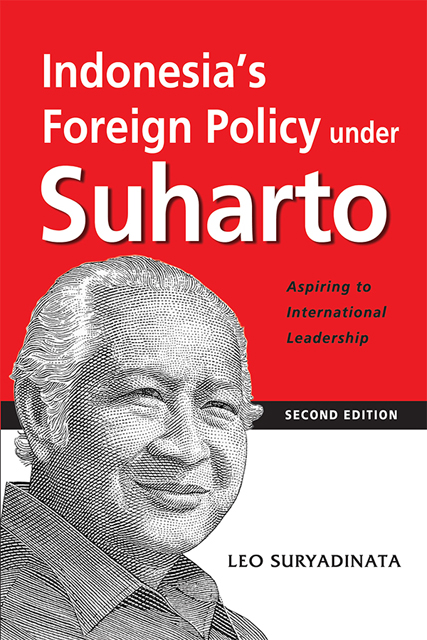Book contents
- Frontmatter
- Contents
- Preface to the Second Edition
- Preface
- Acknowledgements
- Introduction: Suharto’s Foreign Policy
- 1 Determinants of Indonesia’s Foreign Policy: In Search of an Explanation
- 2 Indonesia’s Foreign Policy before the New Order: In Search of a Format
- 3 Indonesia’s Foreign Policy during the “New Order” (I): The Rise of the Military
- 4 Indonesia’s Foreign Policy during the “New Order” (II): The Assertive Role of the President
- 5 Indonesia’s Relations with the ASEAN States: Regional Stability and Leadership Role
- 6 Indonesia’s Relations with Australia and Papua New Guinea: Security and Cultural Issues
- 7 Indonesia-China Relations: Ideology, Ethnic Chinese and the President
- 8 Indonesia-Vietnam Relations and the Kampuchean Issue: The Security Factor
- 9 Indonesia-Superpower Relations: Economic and Non-Economic Factors
- 10 Indonesia, the Middle East and Bosnia: Islam and Foreign Policy
- 11 Indonesia, the Non-Aligned Movement and APEC: In Search of a Leadership Role
- Conclusion: To Lead and Not to Be Led
- Postscript: Indonesia’s Foreign Policy from the Fall of Suharto to Joko Widodo: Still Aspiring to International Leadership?
- Bibliography
- Appendices
- Index
1 - Determinants of Indonesia’s Foreign Policy: In Search of an Explanation
Published online by Cambridge University Press: 01 September 2023
- Frontmatter
- Contents
- Preface to the Second Edition
- Preface
- Acknowledgements
- Introduction: Suharto’s Foreign Policy
- 1 Determinants of Indonesia’s Foreign Policy: In Search of an Explanation
- 2 Indonesia’s Foreign Policy before the New Order: In Search of a Format
- 3 Indonesia’s Foreign Policy during the “New Order” (I): The Rise of the Military
- 4 Indonesia’s Foreign Policy during the “New Order” (II): The Assertive Role of the President
- 5 Indonesia’s Relations with the ASEAN States: Regional Stability and Leadership Role
- 6 Indonesia’s Relations with Australia and Papua New Guinea: Security and Cultural Issues
- 7 Indonesia-China Relations: Ideology, Ethnic Chinese and the President
- 8 Indonesia-Vietnam Relations and the Kampuchean Issue: The Security Factor
- 9 Indonesia-Superpower Relations: Economic and Non-Economic Factors
- 10 Indonesia, the Middle East and Bosnia: Islam and Foreign Policy
- 11 Indonesia, the Non-Aligned Movement and APEC: In Search of a Leadership Role
- Conclusion: To Lead and Not to Be Led
- Postscript: Indonesia’s Foreign Policy from the Fall of Suharto to Joko Widodo: Still Aspiring to International Leadership?
- Bibliography
- Appendices
- Index
Summary
Introduction
This chapter identifies a number of factors which influence, if not determine, Indonesia’s foreign policy. These factors include Indonesian leaders’ perceptions of territorial boundaries, Indonesia’s role in world affairs, and the constraint on its behaviour posed by the country’s available resources. Indonesian political culture and elite perceptions of external threat will also be examined because they may throw light on Indonesia’s foreign policy behaviour.
Indonesia’s Territory and Role in World Affairs
The perception of Indonesia’s territory and role in world affairs by its leaders is important because of its effect on Indonesia’s foreign policy behaviour. The difficulty, however, is in determining whose perceptions should be accepted as valid. Should they be those of the foreign policy elite or should they be those of Indonesian leaders in general? It is reasonable to assume that the perceptions of Indonesian leaders responsible for formulating foreign policy are the crucial ones. In the case of Indonesia, however, domestic policy-makers and foreign policy leaders are often the same individuals. This has been reflected in the role of the President, especially during the Guided Democracy and New Order periods.
Indonesia’s history and traditions have been mainly responsible for the perceptions of Indonesian leaders concerning the nation’s territory and role in world affairs. Indonesia, before August 1945, was known as the Dutch East Indies and the country is still defined today by the former boundaries of the Dutch colony. (Since 1976, Indonesia has also included the former Portuguese East Timor.) Most Indonesian leaders, however, especially the pre-war nationalists and the 1945 generation, consider Indonesia to be a continuation of two ancient empires, Sriwijaya and Majapahit.
Before independence, Indonesian leaders debated the boundaries of an independent Indonesia. One view, represented by Mohammad Yamin, a nationalist poet and statesman, for example, subscribed to the “Great Indonesia” concept (Indonesia Raya). He maintained that the height of the Majapahit Empire was the period of greatest glory in Indonesia’s history. Citing the work of Prapanca, a fourteenth century poet of Java, Yamin said that Indonesia, under Majapahit rule, had included the Dutch East Indies, Malaya (Peninsular Malaysia), Borneo, Timor, and Papua (New Guinea). He believed that an independent Indonesia should include the former territory of the Majapahit Empire.
- Type
- Chapter
- Information
- Indonesia's Foreign Policy under SuhartoAspiring to International Leadership, pp. 5 - 21Publisher: ISEAS–Yusof Ishak InstituteFirst published in: 2023



